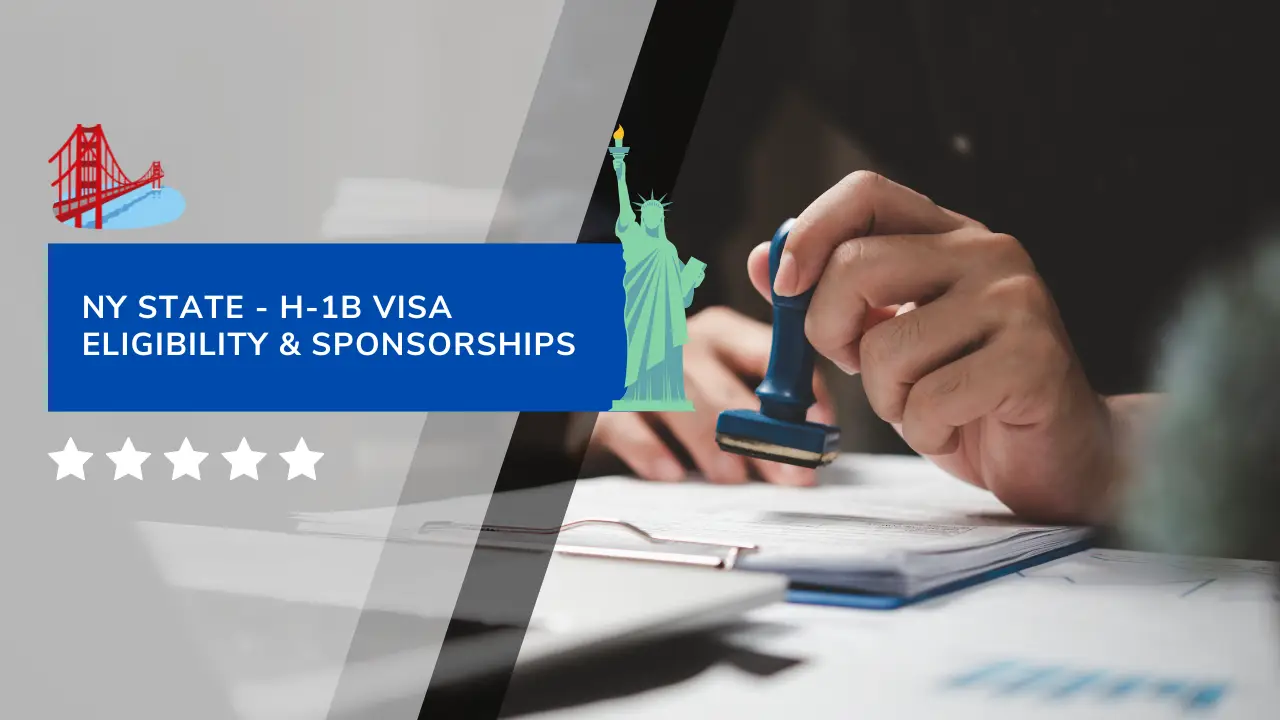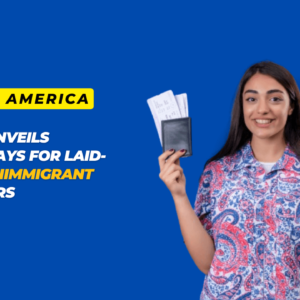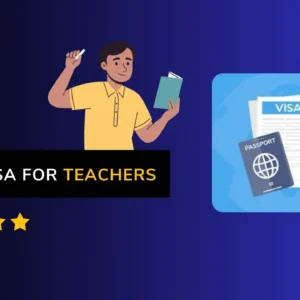The H-1B visa program significantly impacts the employment landscape for foreign professionals in the United States. If you’re considering work opportunities in New York State, you might wonder: Does NY State Offer H1B Visa Sponsorhips? This question is crucial for international workers seeking to build careers in one of America’s most vibrant economic hubs.
In this article, you’ll gain insights into the H-1B visa process in New York State. We’ll explore the stance of the NY state on H1B visas, list companies that consistently sponsor H1B visas, and break down the application process for employers. You’ll also learn about challenges, limitations, and alternatives to H1B visas in New York, helping you confidently navigate your career path.
Overview of the H1B Visa Program
Definition and purpose of H1B visas
The H-1B visa program has a significant impact on the U.S. employment landscape, especially for foreign professionals seeking work opportunities. This nonimmigrant visa classification temporarily allows U.S. employers to hire highly skilled foreign workers in specialty occupations. These jobs typically require specialized knowledge and at least a bachelor’s degree or its equivalent in a specific field.
The primary purpose of the H-1B visa is to help U.S. companies fill positions that demand specific expertise when they can’t find suitable candidates among the domestic workforce. This program plays a crucial role in various industries, particularly in fields such as mathematics, engineering, technology, and medical sciences.
General eligibility requirements
To qualify for an H-1B visa, both the job position and the foreign worker must meet specific criteria. For the job to be considered a specialty occupation, it must require the application of specialized knowledge and a minimum of a bachelor’s degree in the relevant field.
As for the foreign worker, you need to meet one of the following educational requirements:
- Hold a U.S. bachelor’s degree or higher in the specific specialty
- Have a foreign degree that’s equivalent to a U.S. bachelor’s degree or higher in the relevant field
- Hold an unrestricted state license, registration, or certification authorizing you to practice the specialty occupation
In some cases, a combination of education, specialized training, and progressively responsible work experience may be considered equivalent to a U.S. bachelor’s degree.
It’s important to note that having a bachelor’s degree alone doesn’t automatically qualify you for an H-1B visa. The job must require this level of education and your degree should be directly related to the position you’re applying for.
Federal vs. state involvement in H1B visas
The H-1B visa program is primarily regulated at the federal level, with key agencies such as U.S. Citizenship and Immigration Services (USCIS) and the Department of Labor (DOL) overseeing the process. However, states also have a role in certain aspects of the program.
At the federal level, USCIS is responsible for processing H-1B petitions and determining eligibility. The DOL, on the other hand, handles the Labor Condition Application (LCA), which is a crucial step in the H-1B process. Employers must file an LCA with the DOL, certifying that they will pay the H-1B worker the prevailing wage and that employing the foreign worker won’t adversely affect U.S. workers’ conditions.
While states don’t directly offer H-1B visas, they can influence the process in several ways. For instance, some professions require state-specific licenses to practice. In such cases, you must obtain the necessary state license before your H-1B petition can be approved. Additionally, states may have their own regulations regarding employment practices that could affect H-1B workers.
It’s worth noting that certain employers, such as universities, nonprofit research organizations, and government research institutions, are exempt from the annual H-1B cap set by the federal government. This exemption can make these institutions more attractive to foreign workers seeking H-1B sponsorship.
List of H1B Sponsorship Companies in New York State
Top 10 companies sponsoring H-1B visas in New York City
As a global financial hub, New York City attracts numerous companies that sponsor H-1B visas for skilled foreign workers. Here’s a list of the top 10 companies sponsoring H-1B visas in New York City in 2023:
- Ernst Young (EY): 988 H-1B applications
- Goldman Sachs: 977 H-1B applications
- Google: 717 H-1B applications
- Facebook (Meta Platforms): 573 H-1B applications
- JP Morgan Chase & Co: 511 H-1B applications
- Morgan Stanley Services Group: 470 H-1B applications
- Citibank: 402 H-1B applications
- Bloomberg: 378 H-1B applications
- Amazon: 378 H-1B applications
- Columbia University: 358 H-1B applications
These companies span various industries, including consulting, finance, technology, and education, showcasing the diverse opportunities available for H-1B visa holders in New York City.
Details of Salary
The salary offered to H-1B visa holders in New York City varies significantly depending on the company and position. Here are some insights into the salary ranges:
- The 90th percentile salary for H-1B visa holders in New York City is $217,000.
- Bloomberg offers the highest average salary among the top 10 sponsors at $198,624.
- Meta Platforms (Facebook) follows closely with an average salary of $196,762.
- Ernst Young, despite having the highest number of applications, offers a comparatively lower average salary of $121,659.
- Columbia University, being an educational institution, has the lowest average salary among the top 10 at $92,785.
It’s important to note that these figures are averages, and actual salaries may vary based on factors such as job role, experience, and specific skills required.
Approval Statistics information
The approval process for H-1B visas involves multiple steps and agencies. Here are some key statistics:
- The U.S. Department of Labor (DOL) typically certifies more than three times the number of foreign work requests compared to the number of H-1B visas issued by USCIS.
- Only 14% of H-1B registrations were selected in the lottery in 2023, indicating the high competition for these visas.
- New York University, a major H-1B sponsor in New York, filed 81 Labor Condition Applications (LCAs) in fiscal year 2024, with 80 approved and none denied.
Why work in New York City?
New York City offers numerous advantages for H-1B visa holders:
- Global financial center: It’s considered the financial capital of the world, providing opportunities in various financial institutions.
- Diverse job market: The city offers many career options, from tech giants to startups.
- Cultural hub: Known for its vibrant arts, theater, cuisine, and fashion scenes.
- International community: Home to one of the largest populations of international students in the U.S.
- Career growth: The city’s competitive environment can accelerate professional development.
- Networking opportunities: With numerous industry events and meetups, building professional connections is easier.
Working in New York City on an H-1B visa can provide valuable experience and potentially open doors to long-term career prospects in the United States.
New York State’s Stance on H1B Visas
Historical perspective on NY State’s H1B visa applications
New York State has long been a significant player in the H-1B visa landscape. Over the years, the state has consistently ranked among the top destinations for H-1B visa holders, particularly due to its thriving business environment and diverse job market. From fiscal year 2010 to 2016, the New York City metro area received about 247,900 H-1B visa approvals, accounting for 29% of the nation’s total. This substantial share highlights the state’s historical importance in attracting skilled foreign workers.
Current policies and practices
Currently, New York State doesn’t directly offer H1B visas, as the program is primarily regulated at the federal level. However, the state’s policies and practices have a significant impact on how companies within its borders utilize the H-1B program.
New York has maintained a generally supportive stance towards the H-1B visa program, recognizing its importance in filling specialized positions and contributing to the state’s economic growth.
The state government and many employers in New York continue to work within the federal framework to sponsor H-1B visas. For instance, New York University, a major H-1B sponsor in the state, filed 81 Labor Condition Applications (LCAs) in fiscal year 2024, with 80 approved and none denied. This high approval rate suggests a well-established process for H-1B sponsorship within the state.
Comparison with other states
When compared to other states, New York holds a prominent position in terms of H-1B visa utilization. While California has historically been the state with the most H-1B workers, with over 100,000 initial and continuing visas in FY 2022, New York follows closely behind states like Texas and New Jersey, with approximately 24,000 to 36,000 H-1B workers.
In terms of salary offerings, New York City stands out. Nationwide, foreign workers approved for H-1B visas earned an average of $80,600 in fiscal years 2010-2016. However, the New York City metro area, along with other high-cost regions like Bridgeport, Connecticut, and Seattle, typically offers higher salaries to attract top talent.
New York also distinguishes itself in the quality of H-1B workers it attracts. While some metro areas with smaller H-1B approvals have a high percentage of workers with advanced degrees, New York City’s diverse economy attracts a wide range of skilled professionals across various industries.
The state’s approach to the H-1B program reflects its commitment to maintaining a competitive edge in the global talent market. By leveraging the H-1B visa program, New York continues positioning itself as a hub for innovation and specialized expertise, contributing to its status as a leading center for business, finance, and technology.
H1B Visa Application Process for NY State Employers
The process of sponsoring an H-1B visa for foreign workers in New York State involves several steps and requires careful attention to deadlines and documentation. While New York State doesn’t directly offer H-1B visas, employers can sponsor foreign workers through this program.
Steps involved in filing Labor Condition Applications (LCAs)
The first crucial step for NY State employers is to file a Labor Condition Application (LCA) with the U.S. Department of Labor (DOL). This process ensures that hiring foreign workers won’t adversely affect U.S. workers’ wages and working conditions. Here’s what employers need to do:
- Submit Form ETA-9035 electronically through the Foreign Labor Application Gateway (FLAG) system.
- Provide essential information such as job title, employment period, and prevailing wage.
- Make attestations regarding wages, working conditions, and the absence of labor disputes.
- Post notice of the LCA in two conspicuous locations at the work site for at least 10 days.
The DOL typically certifies the LCA within 10 business days. However, employers can submit the LCA up to six months before the foreign worker’s expected start date.
Required Documents
NY State employers must prepare and maintain several documents for the H-1B visa application process:
- Certified LCA from the DOL
- Form I-129 (Petition for Nonimmigrant Worker)
- Proof of the company’s existence and Federal Employer Identification Number (FEIN)
- Job offer letter or contract
- Detailed job description and minimum requirements
- Evidence of the beneficiary’s qualifications (e.g., degrees, transcripts, and work experience)
- Passport information or valid travel document for the beneficiary
- Public Access File (PAF) containing LCA-related documents
Employers must also create and maintain a Public Access File for each H-1B worker, which includes the certified LCA, wage information, and other relevant documents.
Timeline and deadlines
The H-1B visa application process follows a strict timeline:
- March: The annual electronic registration window opens
- March-April: USCIS conducts the H-1B lottery if registrations exceed the annual cap
- April-June: Selected employers file full H-1B petitions (within 90 days of selection notification)
- June-August: USCIS may issue Requests for Evidence (RFEs)
- August-September: Final decisions are made
- October 1: Approved H-1B visas become effective
NY State employers must start preparing early and adhere to these deadlines. The initial registration period typically opens in early March and runs for about two weeks. Employers should monitor the USCIS website for specific dates each year.
By understanding these steps, required documentation, and timelines, NY State employers can navigate the H-1B visa application process more effectively, increasing their chances of successfully sponsoring foreign workers in specialty occupations.
Challenges and Limitations
While New York State doesn’t directly offer H1B visas, employers face several challenges when sponsoring foreign workers through this program. These obstacles can impact companies and potential employees seeking work authorization in the United States.
Quota restrictions
One of the most significant challenges is the annual cap on H-1B visas. Congress has set the current yearly regular cap at 65,000 visas, with an additional 20,000 visas for foreign professionals with advanced degrees from U.S. institutions. This limited number of available visas often exceeds the demand, leading to a highly competitive process.
The cap for Fiscal Year 2024 was reached on December 13, 2023, highlighting the intense competition for these visas. The U.S. Citizenship and Immigration Services (USCIS) typically receives more registrations than available visa numbers, necessitating a lottery system to determine which employers can file H-1B petitions.
Processing times and delays
H-1B visa processing times can vary significantly, causing employers and potential employees to be uncertain. Regular processing times can range from as short as 2 months to as long as 8 months, with an average of 3-5 months. This unpredictability can impact project timelines and staffing decisions for companies in New York State.
To address these delays, some employers opt for premium processing, which guarantees a response within 15 business days. However, this expedited service costs additional fees, increasing the overall sponsorship cost.
Impact of recent policy changes
In recent years, fluctuations in H-1B visa policies have affected approval rates and the overall landscape of work visa sponsorship. During the Trump administration, denial rates for new H-1B petitions rose significantly, reaching 24% in FY 2018. However, these rates dropped to just 2% in FY 2022.
Policy changes have also introduced new challenges. In March 2020, USCIS implemented an electronic registration process for the H-1B cap. While this change aimed to reduce the burden on U.S. employers, it has added a new layer of complexity to the application process.
Furthermore, potential future policy changes could significantly impact H-1B sponsorship in New York State. Proposals for more restrictive definitions of specialty occupations and changes to the employer-employee relationship could make it more challenging for companies to sponsor foreign workers.
These challenges and limitations underscore the complexity of the H-1B visa program for New York State employers. While the state continues to be a hub for international talent, navigating the ever-changing landscape of work visa policies requires careful planning and consideration.
Alternatives to H1B Visas in New York
While the H-1B visa program is a popular choice for companies in New York seeking to hire skilled foreign workers, several alternatives are available for those who don’t secure an H-1B visa or are looking for other options. These alternatives can provide valuable pathways for international talent to work in the Empire State.
Other visa options for skilled workers
One notable alternative is the O-1 visa, designed for individuals with extraordinary ability or achievements in their field. This visa suits highly accomplished professionals who can demonstrate sustained national or international acclaim. The O-1 visa offers several advantages over the H-1B, including no annual cap and the possibility of indefinite extensions.
Another option is the L-1 visa, which allows multinational companies to transfer employees from their foreign offices to their U.S. offices. This visa is ideal for companies with a global presence, as it facilitates the movement of key personnel within the organization. L-1 visas are available for executives and managers (L-1A) and employees with specialized knowledge (L-1B).
For Australian nationals, the E-3 visa provides a pathway similar to the H-1B. This visa is specifically for Australians working in specialty occupations and has a separate annual quota often underutilized, making it a viable alternative.
State-specific programs for attracting talent
New York State has recognized the importance of attracting global talent and has taken steps to create a more welcoming environment for immigrant entrepreneurs. Governor Hochul has proposed a multipronged plan to support immigrant entrepreneurs and create pathways to business ownership for foreign-born New Yorkers.
One key initiative is a program allowing international entrepreneurs to obtain university-sponsored visas. This program aims to collaborate with universities to drive innovation and develop startup companies or early-stage ventures in New York. The state plans to provide competitive grants to up to eight research universities and colleges to operate this program.
Additionally, the Governor has proposed creating a virtual Immigrant Entrepreneur Center. This center would serve as a centralized resource for important information and services relevant to immigrant entrepreneurs, making it easier for them to navigate the complexities of starting and running a business in New York.
Employment-based green card options
For those seeking a more permanent solution, employment-based green cards offer a pathway to lawful permanent residency in the United States. These options include:
- EB-1 visa: This first-preference category is for individuals with extraordinary ability in the sciences, arts, education, business, or athletics, outstanding professors and researchers, and certain multinational managers and executives.
- EB-2 visa: This second preference category is for professionals holding advanced degrees or those with exceptional ability in their field.
- EB-3 visa: This third-preference category is for skilled workers, professionals, and other workers.
These employment-based green card options provide a long-term solution for companies looking to retain international talent in New York. The process typically involves filing Form I-485 to adjust status to become a lawful permanent resident, followed by an interview with U.S. Citizenship and Immigration Services (USCIS).
Conclusion
The H-1B visa program has a significant impact on New York’s employment landscape, offering opportunities for skilled foreign professionals to work in various industries. While the state doesn’t directly offer H-1B visas, many companies in New York actively sponsor these visas, particularly in sectors like finance, technology, and education. The process involves several steps, from filing Labor Condition Applications to navigating quota restrictions and processing times.
For those unable to secure an H-1B visa, New York provides alternative pathways to attract global talent. These include other visa options like O-1 and L-1 visas, state-specific programs to support immigrant entrepreneurs and employment-based green card options. By offering these alternatives, New York aims to maintain its position as a hub for innovation and specialized expertise, contributing to its status as a leading center for business and technology.
FAQs
- Does New York Life Insurance Company provide H1B visa sponsorship?
Yes, New York Life Insurance Company does sponsor H1B visas. According to the US Department of Labor, they submitted 82 Labor Condition Applications (LCAs) for the fiscal year 2024.
- Is NYU a sponsor for H1B visas?
At NYU, research staff are generally eligible for H1B visa sponsorship. Administrative and support roles depend on individual cases, and inquiries should be directed to the university’s HR department.
- What is the typical salary range for H1B visa holders in New York?
In New York, the salary for H1B visa holders starts at around USD 154,300, representing the 25th percentile. Salaries below this figure are considered outliers. The salary can go up to USD 210,100, at the 75th percentile.
- Does The New York Times sponsor H1B visas?
Yes, The New York Times Company does sponsor H1B visas.
- What are the prospects of securing an H1B visa for a university role in New York State with a background in research support at an Irish university?
With a decade of experience in research support at an Irish university, obtaining an H1B visa for a similar role in New York State can be feasible, especially with previous experience living and working in New York on J1 visas. However, securing employment from abroad might pose more challenges compared to being in the U.S. on visas like F1 or J1.




